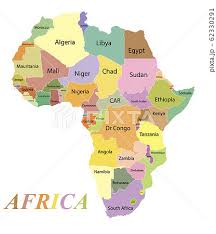Perspectives on factors destabilising West and Central African sub-regions, by Baba Isimi
The West and Central African subregions have been destabilised by three factors.
■ The first is climate change and it impact on mass migration and conflicts.
■ The collapse of Libya and the proliferation of arms and munitions from libyan stockpile and external sources.
■ The conducive enviroment provided in the region for rise of Islamic fundamentalism by .
▪ Poor level governance quality and it’s impact on Human resources development index.
▪ Vast tracts of ungoverned territories and enclaves across the sahel belt which serve as shelter for anti social elements- bandits , insurgents , and all varieties of vagrants and extremist.
I proceed to elucidate on these;
First, climate change compelled migration of herders from the arid Sahel belt southwards towards the Guinea Savannah and rain forest belts; and, particularly towards the river basins and wetlands, especially towards Niger-Benue Basin in Nigeria. The result has been the cause of the farmer/herders’ clashes within the central zone of Nigeria. Due to climate change , the sahara desert has gradually enchroached into the Sahel belt of West and Central Africa, forcing herders and farmers to move down towards the into the guinea savannah and rain forest climatic regions . This movement is responsible for destabilizing
the peaceful co-existence of farmers and pastoralists (herders) in these regions. Accompanying this is rapid population growth and urbanisation with added burden on the carrying capacity of the natural resources such as vegetation and freshwater, exercebating the struggle between the two groups who depend on the land for their livelihood and survival. In the case of the farmers, the rapid population growth requires increased food production, resulting in rapid
expansion of farmland and for the Herder, it has resulted in enchriachment of grazing land, which is further compounded by decrease in grazing land as result of desertification with it’s attendant poor vegetal cover in the region. These are the factors that have created the unhealthy struggle for scare land resources between the herders and farmers worsened by decreased surface or groundwater for grazing animals and farming purposes. These are the core reasons for violent conflicts between farmers and herders over limited farming and grazing lands which has created the crisis and conflicts resulting in mayhem, deaths, displacements, loss of properties, livestock, land and entire settlements in the entire West and Central Africa. Sadly, these conflicts have now metamorphosed into full-blown banditry, as result some herdsmen are now classified as notorious terrorists, kidnappers for ransom and insurgents.
READ ALSO: How the U.S. fumbled Niger’s coup and gave Russia an opening
There was the collapse of Libya, which had been a massive destabilizing force within the region especially the resultant massive proliferation of small and medium arms across the West and Central African regions; while third point has been the rise of Islamic fundamentalism within the more improvised part of the West and Central African region. This has posed a critical challenge, turning into major areas of foment within the contiguous band from Sene-Gambia , Guinea, Mali, Burkina Faso, Niger, Tchad through to Central African Republic. Unfortunately, these are the Nations which share borders with Libya, The birder proximity has enabled and facilitated the easy inflow of arms for usage by the insurgent groups.
● The implications of our ECOWAS policy
The current diplomatic impasse will only encourage the military in these countries to allow these religious extremists and nomadic cattle Herders into the country; and, in fact encourage and facilitate insurgents to have greater access into Nigeria which has an extremely porous border. The fact is that the stance of Nigeria and ECOWAS is a disincentive for the military-led nations to collaborate with Nigeria or the other members of ECOWAS to stop these insurgents, bandits and vagrants from migrating to cause havoc within the region. In fact, these nations may become sanctuaries for these vagrant insurgents and extremists of all types of fundamental religious hues.
It is possible that soon some of these nations may start giving protection and sanctuary to: and, in fact, becoming training grounds to insurrectionists from where they could launch their attacks across their borders into Nigeria and West Africa.
Architect Baba Isimi is a businessman and politician based in Abuja.
Follow the Neptune Prime channel on WhatsApp: https://whatsapp.com/channel/0029Va74ZvU2v1IqKByXoX3d
Do you have breaking news, interview request, opinion, suggestion, or want your event covered? Email us at neptuneprime2233@gmail.com


